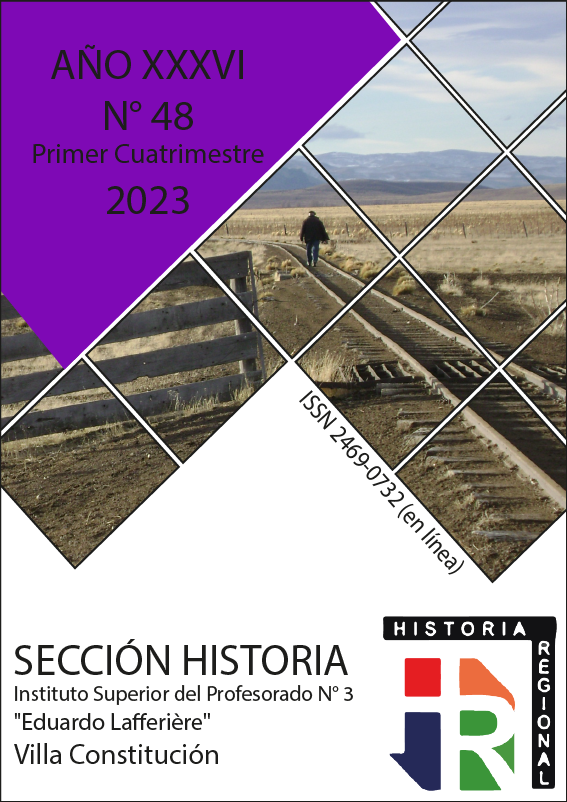Voices and gestures becoming extinct: the audiovisual archive as a safeguard of bodily subjectivity of captives from the Magdalenes
Main Article Content
Abstract
The discovery in Ireland of a mass grave on the land of a convent of the Magdalenes in 1993, depositary of remains of one hundred and fifty-five women and girls, eroded the hegemony held on the island by the State-Church duo since proclamation of the independence. Historians, sociologists and filmmakers embarked on independent investigations from government and academic officialdom, with documentary film being the first tool for disseminating the revelations provided by asylum survivors. We propose to analyze the testimonial film Convents of shame and transcripts from testimonies kept in the Magdalene Oral History Project archive. We will try, by establishing a dialogue between sources, to demonstrate the importance of audiovisual archives for the recording and conservation of transformative performances and body subjectivities, as well as for the performance of secondary analyzes of oral history interviews that deepen our understanding of the concept of social death.
Downloads
Download data is not yet available.
Article Details
How to Cite
Brain, P. (2022). Voices and gestures becoming extinct: the audiovisual archive as a safeguard of bodily subjectivity of captives from the Magdalenes. Historia Regional, (48), 1-15. Retrieved from https://historiaregional.org/ojs/index.php/historiaregional/article/view/716
Section
Dossier

This work is licensed under a Creative Commons Attribution 4.0 International License.
Los autores que publican en esta revista están de acuerdo con los siguientes términos:
- Los autores conservan los derechos de autor y garantizan a la revista el derecho de ser la primera publicación del trabajo al igual que licenciado bajo una Creative Commons Attribution License que permite a otros compartir el trabajo con un reconocimiento de la autoría del trabajo y la publicación inicial en esta revista.
- Los autores pueden establecer por separado acuerdos adicionales para la distribución no exclusiva de la versión de la obra publicada en la revista (por ejemplo, situarlo en un repositorio institucional o publicarlo en un libro), con un reconocimiento de su publicación inicial en esta revista.
- Se permite y se anima a los autores a difundir sus trabajos electrónicamente (por ejemplo, en repositorios institucionales o en su propio sitio web) antes y durante el proceso de envío, ya que puede dar lugar a intercambios productivos, así como a una citación más temprana y mayor de los trabajos publicados (Véase The Effect of Open Access) (en inglés).
References
Barraza García, R. (2017). Cuando la Frontera se encarna: Mujeres migrantes y trabajo doméstico en la Frontera Sur de México. Universidad de Salamanca.
Brain, P. (2016). Las cautivas de las Magdalenas: memorias rescatadas de confinamientos velados. Trabajo presentado en el seminario Antropología de la Memoria y la Identidad, dictado por la Dra. Ludmila Catela.
Brain, P. (2018). De cautivas silenciadas y empresas conventuales. Entrevistas a sobrevivientes de los asilos de la Magdalena irlandeses. Fuentes de Historia Medieval, Moderna y Contemporánea, FHCS/UNP.
Brain, P. (2018). Sex in a cold climate: memorias rescatadas de cautivas silenciadas y confinamientos velados. Ponencia presentada en el XIII Encuentro Nacional y VII Congreso Internacional de Historia Oral de la República Argentina.
Brain, P. (2020). Los lavaderos de la Magdalena en Irlanda: análisis de movimientos estructurales y fluctuaciones coyunturales del último cuarto del siglo XX a través de un estudio de caso. Trabajo presentado en el seminario Historia comparada del siglo XX, dictado por el Dr. Alejandro Simonoff.
Finnegan, F. (2001). Do penance or perish: Magdalene Asylums in Ireland. England: Oxford University Press.
Fischer, C. (2016). “Gender, nation, and the politics of shame: Magdalen laundries and the institutionalization of feminine transgression in modern Ireland”, Journal of Women in Culture and Society.
Glynn, E. (2009). ‘Left Holding the Baby’. Remembering and Forgetting the Magdalen Laundry. Limerick: Printmaker.
Nichols, B. (1997). La representación de la realidad. Cuestiones y conceptos sobre el documental. Barcelona: Paidós.
Nichols, B. (2013). Introducción al documental. México: UNAM.
Pelletier M. E. (1991). Instrucciones y conferencias. Bogotá: Centro Carismático Minuto de Dios.
Portelli, A. (2016). Historias orales. Narración, imaginación y diálogo. Rosario: Prohistoria Ediciones.
Sánchez-Biosca, V. (2016). Cine de historia, cine de memoria. La representación y sus límites. Madrid: Ediciones Cátedra.
Scott, K. A. (2018). Oral histories of Ireland’s Magdalene Laundries: a method for examining social death.
Brain, P. (2016). Las cautivas de las Magdalenas: memorias rescatadas de confinamientos velados. Trabajo presentado en el seminario Antropología de la Memoria y la Identidad, dictado por la Dra. Ludmila Catela.
Brain, P. (2018). De cautivas silenciadas y empresas conventuales. Entrevistas a sobrevivientes de los asilos de la Magdalena irlandeses. Fuentes de Historia Medieval, Moderna y Contemporánea, FHCS/UNP.
Brain, P. (2018). Sex in a cold climate: memorias rescatadas de cautivas silenciadas y confinamientos velados. Ponencia presentada en el XIII Encuentro Nacional y VII Congreso Internacional de Historia Oral de la República Argentina.
Brain, P. (2020). Los lavaderos de la Magdalena en Irlanda: análisis de movimientos estructurales y fluctuaciones coyunturales del último cuarto del siglo XX a través de un estudio de caso. Trabajo presentado en el seminario Historia comparada del siglo XX, dictado por el Dr. Alejandro Simonoff.
Finnegan, F. (2001). Do penance or perish: Magdalene Asylums in Ireland. England: Oxford University Press.
Fischer, C. (2016). “Gender, nation, and the politics of shame: Magdalen laundries and the institutionalization of feminine transgression in modern Ireland”, Journal of Women in Culture and Society.
Glynn, E. (2009). ‘Left Holding the Baby’. Remembering and Forgetting the Magdalen Laundry. Limerick: Printmaker.
Nichols, B. (1997). La representación de la realidad. Cuestiones y conceptos sobre el documental. Barcelona: Paidós.
Nichols, B. (2013). Introducción al documental. México: UNAM.
Pelletier M. E. (1991). Instrucciones y conferencias. Bogotá: Centro Carismático Minuto de Dios.
Portelli, A. (2016). Historias orales. Narración, imaginación y diálogo. Rosario: Prohistoria Ediciones.
Sánchez-Biosca, V. (2016). Cine de historia, cine de memoria. La representación y sus límites. Madrid: Ediciones Cátedra.
Scott, K. A. (2018). Oral histories of Ireland’s Magdalene Laundries: a method for examining social death.

